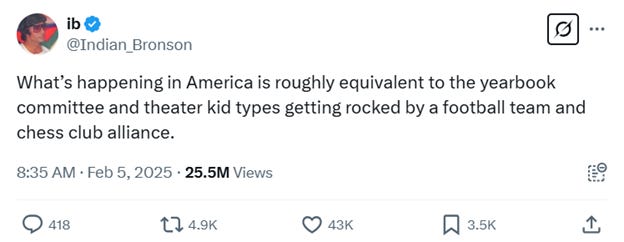The EM-50 Project
Maybe conditions are much worse than we know. That's one way to explain the urgency and the nature of current policy.
I saw a funny tweet a couple of weeks ago.
It’s certainly chaotic, whatever it is.
I would put it differently. What’s happening in America is roughly equivalent to the keeners who sit in the front of the classroom and do as they’re told being forced to work for the back-of-the-classroom rebels.
There is fear. There is loathing.
It’s not clear what is worse, that this kind of restructuring is taking place or that these people (these people!) are in charge.
There is an argument to be made that there was no alternative to reform. The previous administration went crazy over the past four years. For many people, the federal government was the goose that laid golden eggs. It funneled money to their favored causes. It sent money to a phalanx of non-governmental organizations to do things that statute never specified, paying lots of Beautiful People healthy stipends in the process. The civil service was a de facto permanent patronage system that catered to only one party. But over the last four years we killed the goose with a level of spending that sent debt servicing costs to untenable levels even as we constrained and limited and distorted the economic growth necessary to sustain it. Impatience to spend the money faster and in a lopsided, partisan fashion killed the goose that laid the golden eggs.
This is why we can’t have nice things.
If they had just let things continue as they were, the slow creep of increasing bureaucratic control would have been uninterrupted.
They just couldn’t wait.
Do they even teach fables anymore? Wouldn’t it be ironic if the Department of Education or the teachers’ unions recommended twenty-five years ago to remove these stories from school libraries and to pull them from the curriculum, say for being politically incorrect, only to have this missed wisdom lead to the gutting of the administrative state? If the replacement of stories assuming the constancy of human nature by more contemporary, relativistic tales that preached the new fashionable postmodern doctrine created the conditions for this disruption, then it would be a phenomenon that could itself be a fable for future generations.
The beauty of this funny tweet is that it alludes to something everyone recognizes: school teaches us how to conform to the bureaucratic systems that pervade adult life in the West. On the face of it, we attend school to learn things. Or, ideally, we learn how to learn, internalizing the doctrine that we should think of ourselves as lifelong students. How many people really study as adults, though? How many write? How many think?
The education system in the West is about producing industrial cogs at scale. We don’t expect greatness or genius from these fleshy widgets. We do require a safe, consumerist mediocrity.
University of Pennsylvania professor Adam Grant wrote about the efficacy of education a few years ago.
‘Academic excellence is not a strong predictor of career excellence. Across industries, research shows that the correlation between grades and job performance is modest in the first year after college and trivial within a handful of years. For example, at Google, once employees are two or three years out of college, their grades have no bearing on their performance. (Of course, it must be said that if you got D’s, you probably didn’t end up at Google.)’
‘Academic grades rarely assess qualities like creativity, leadership and teamwork skills, or social, emotional and political intelligence. Yes, straight-A students master cramming information and regurgitating it on exams. But career success is rarely about finding the right solution to a problem — it’s more about finding the right problem to solve.”’
And this.
‘Getting straight A’s requires conformity. Having an influential career demands originality. In a study of students who graduated at the top of their class, the education researcher Karen Arnold found that although they usually had successful careers, they rarely reached the upper echelons. “Valedictorians aren’t likely to be the future’s visionaries,” Dr. Arnold explained. “They typically settle into the system instead of shaking it up.”’
In the novel Brave New World, there was a hard caste system based on intellectual advantage. The Alpha Plus was at the top of the pyramid with Betas through Epsilons underneath, performing progressively more disagreeable work. Placement was determined by an IQ engineered in the test tubes in which people were conceived. This social arrangement was held in place by a system that delivered nothing but comfort. People played games. They consumed goods (including lots of drugs that cossetted them from any pain that might arise). They pursued frequent meaningless sexual encounters. All while a thin elite of Controllers managed the system to ensure order and stability.
It wasn’t some dystopian takeover by forces stamping out freedom. The contrived comfort lulled everyone into pliant harmony. It was a fascism of hedonistic complacency combined with tight sticklerism to the rules and regulations.
The people who get straight As surely believe that they are the Alpha Plus caste of the world in which we live. Discovering that a Beta Minus from South Africa and some other khaki-clad mids are now in charge must be more than many of them can bear. They certainly struggle to accept the necessity or propriety of the current radical change. Having put us on the chaotic frontier, they are motion sick from the disruption.
Another irony is that credentialed and academically successful people scorn caste as the antediluvian social order of primitives even as these same people believe that their good grades and model behavior ennoble them to Brahminical heights.
The people who succeed, as Grant points out, are people who take risks. They have social and political skills. In many cases, they are not people who did well in school.
‘This might explain why Steve Jobs finished high school with a 2.65 G.P.A., J.K. Rowling graduated from the University of Exeter with roughly a C average, and the Rev. Dr. Martin Luther King Jr. got only one A in his four years at Morehouse.’
Or how about Charles Darwin or Albert Einstein? Or Thomas Edison or Winston Churchill or Bill Gates?
If you were a VC and you had to choose between funding one of the two following people, who would you pick? You are selecting for impact. You want someone who will change the way we think about things and improve the world.
Person 1: A young man adopted by working class parents, Bob has varied interests. He’s curious. He wasn’t a good student. His apparent boredom manifested itself as indifference or an ordinary intellect. His father was an artisan with a passion for detail and doing things the right way. Bob was curious about a great many things. He took to calligraphy as well as coding. Bob grew up in the San Francisco Bay area. He dropped out of college, but continued to audit classes for a year, focusing only on topics that interested him.
Person 2: A young woman with stellar grades, Sarah was the valedictorian of her boarding school before shipping off to Yale. Her parents and grandparents are very wealthy. There is a strong record of academic achievement in the family. Sarah has been told all her life that she is gifted. The expectation is that grades are the primary and, really, the only way to judge someone’s value, so academic achievement has been her lodestar. She does not have many friends nor does she seem to keep them beyond a brief, shallow engagement corresponding to the school year. They are like the clothes she buys as the seasons of her life change. She has multiple job offers from leading investment banks and consulting firms, but she has decided that she should pursue a startup career at this stage in her life. She took all the AI classes she could find at Yale and has built several GPTs (none of which has much traction in the OpenAI marketplace yet).
I know who I’d pick.
There is no Brave New World. Pursuing one brings its own instability. The novel was a poetic caution.
We were always going to have to clean up the mess.
In the words of Dean Wormer, “The time has come for someone to put his foot down and that foot is me.” That foot is Elon Musk.
We are over-extended. I have a sneaking suspicion that the system is far more fragile than we know, than we have been told. That’s one way for explaining the nature of the moves we observe.
Whatever the case, we’re in it to win it now.
We should all hope to emerge on the other side with a more stable, healthier equilibrium.





Great post, Chand. Though the guys at the back were a mixed bag, rebels mixed with goons and stoners.